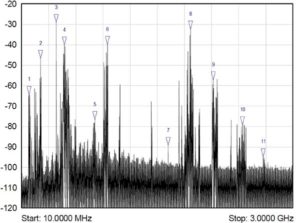Blog Editor’s Note: Another outstanding article by Mike Jones. Several points he makes are worth restating:
- One disadvantage of SOOP is that it can require complex hardware to do it well.
- You cannot afford to rely on signals that you don’t control.
- SOOP is also highly dependent on where you are. There aren’t many opportunistic signals at sea or in the desert, compared to in the urban environment (perhaps the odd satellite signal, or HF signal).
Mike concludes that SOOP could be a good to add to what you already have, especially if money is no object (our comment), but won’t become a primary means of navigation.

Plenty of opportunistic signals are out there – Michael Jones
Signals of opportunity: Holy Grail or a waste of time?
GPS World
In broad terms, SOOP refers to the use of any signals for navigation, which are not normally intended for navigation. This might mean TV or radio broadcast signals, cellular network signals, or anything else you can receive.
What signals might we use?
The figure below shows what we get if you use a spectrum analyzer to quickly sample what’s on the airwaves in the UK, in this case looking fairly coarsely from 10 MHz to 3 GHz. A number of candidate signals immediately present themselves, which are labeled 1 to 11 and identified in the table.

